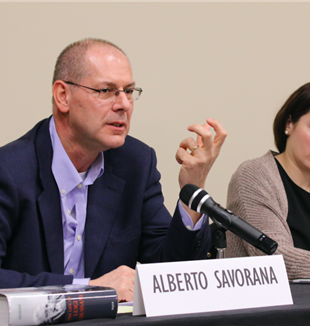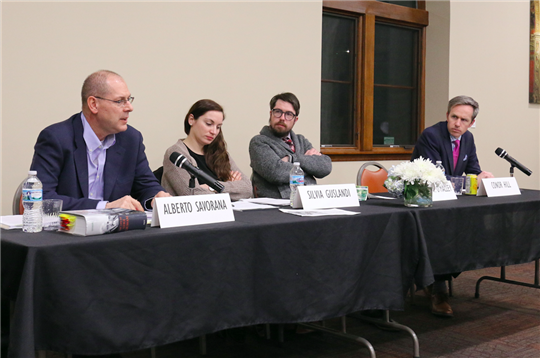
The Life of Luigi Giussani: Education, Free and Unafraid
On March 18 in Chicago, Illinois, Alberto Savorana spoke alongside Timothy P. O'Malley, Conor Hill, and Silvia Guslandi for the Life of Luigi Giussani book tour. Read the full story."Education: Free and Unafraid" was the topic of a discussion among Alberto Savorana, journalist and author of The Life of Luigi Giussani, Timothy P. O'Malley, director of the Notre Dame Center for Liturgy, and associate professional specialist in the Department of Theology, and Conor Hill, headmaster of the Chesterton Academy of the Holy Family, a high school in suburban Chicago espousing cultura vitae ("culture in life") in the spirit of Saint Pope John Paul II. The discussion was moderated by Silvia Guslandi of the Department of Romance Languages and Literature at the University of Chicago.
Guslandi had been reading Savorana's biography of Msgr. Luigi Giussani with some friends when she realized that Giussani's approach to education was a key contribution he offered to the world in his public ministry. Giussani witnessed first-hand the atrophy of religious motivation and commitment in high school students in Milan in the 1950s, and Guslandi and her friends realized that the condition at that time was very similar to the one of today's youth across the world and in the Church. After delving into Giussani's thoughts on education and the actions he developed to understand and to try to remedy this condition -- including the founding of Communion and Liberation -- they found his ideas of great continuing interest and relevance. Guslandi cited as an example Giussani’s prescient statement -- which was made before the advent of the internet -- that "never before has the environment been able to invade consciousness so despotically." The panel discussion was a further step to understand how educators today can address the increasingly secularized educational environment and what contribution Giussani's views can make to address them.
Guslandi first asked the two academic panelists how Giussani's ideas influenced each of their educational approaches.
To this, Hill responded that he would characterize Giussani's unique contribution to his own formation in two statements: "Living reality intensely" and "Christianity as an event." He recounted how a college introductory Catholicism course taught by Regis Martin prompted him to think that he had never before heard anyone speak about Christianity in that manner. Martin proposed the personality of Christ in a fascinating way, quoting T.S. Eliot, Gerard Manley Hopkins, Charles Péguy, and other poets, much like Giussani would make use of poetry, art, and music to motivate students. That class awakened in Hill a wonder before Catholicism that was consolidated in another course with Fr. Antonio López, "Jesu, Dulces Presencia" ("Jesus, Sweet Presence"), at the John Paul II Institute in Washington, D.C., which led to a second conversion in Hill's life, helping him to discover the beauty of the Catholic faith.
O'Malley, instead, said that he became aware of Giussani as a result of a suggestion by students that they read The Risk of Education in a graduate seminar. At first skeptical of modern philosophy of education texts, he came to appreciate Giussani's approach, which allowed him to chart a course away from secularism and sectarianism, oriented to reality and at the same time deeply aware of how divine revelation expresses itself in the world. He finally realized he didn't have to adopt a scholar's persona but was liberated to bring his full self to education. 
Savorana observed that all throughout his life, Giussani considered education to be the central issue in all societies since the future of said societies depends on the capacity of adults to communicate meaning, hope, and certitude to the next generation. A society unable to do that condemns itself to death. Giussani dedicated his life to communicate the "reasonableness" of faith, which is not a feeling or emotion, but is concrete and full of reason because it corresponds to deepest human needs and aspirations. As he discovered through his teachers, continued Savorana, Giussani at an early age proposed that the answer to those who live reality intensely, longing for Truth, Beauty, and Goodness, is the Word made flesh, that is, Truth, Beauty, and Goodness made flesh.
According to Savorana, Giussani communicated this method by helping students learn how to judge for themselves whether what an educator says is true. This is a true act of love: awakening them to the interior criteria to judge the way to Truth, Goodness, and Beauty, and to move them to desire that destiny. This is the only way to become an adult, and must be done in the public square, not in a "safe space" where everyone agrees, as people do not live in safe spaces, but in a world full of people with differing convictions. Christianity, Savorana stated, must be witnessed to arouse attraction, it cannot be "taught" in the first instance as doctrine or dogma.
Subsequently, Guslandi asked about the challenges educators face. Hill confessed his own struggle at times to maintain his faith in his students’ capacity to recognize what is true, and his corresponding doubt of his personal ability to be a presence that is a proposal to his students. O'Malley instead insisted in the need to emphasize to his students that what the secular culture teaches -- education is for economic production and making money– is not true, and that a full life includes one's career but also one’s vocation as a mother or father.
The discussion ended on the question, “What is culture?” O'Malley explained that culture is based on "cult," which provides the vitality that makes life meaningful and worth living. Savorana finally quoted Giussani's recollection of walking with his mother to church. While they were trudging against the wind, his mother paused to remark, "How beautiful the world is! And how great is God." She, concluded Savorana, had a strong concept of culture: how everything in the world, including the beauty of the sky and the wind, has its link to God; Culture is the concrete living of the connection between all that is, and God.#LifeLuigiGiussani